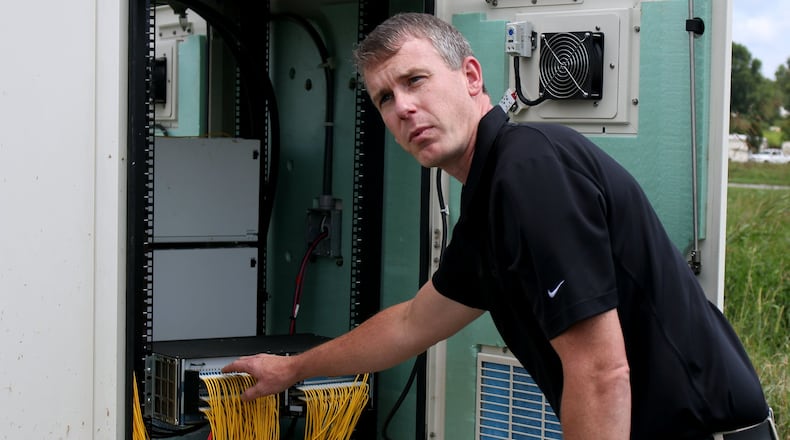The idea of bringing internet service to vast, disconnected swaths of rural Georgia seemed like a laudable — but unreachable — goal.
Who would pay the hundreds of millions of dollars it would cost to build internet lines in sparsely populated areas with few customers?
An inadvertently bipartisan effort recently found a big part of the answer. Democrats in Congress provided funding for Georgia Republicans’ plans to wire one-third of the state’s locations that lack online access.
The result is $408 million for Georgia internet construction from coronavirus relief money that will reach 183,600 residential and business locations, distributed through a series of state laws passed during the past four years.
Both political parties are taking credit, though they didn’t always agree beforehand. Every Republican in the U.S. House and Senate voted against the American Rescue Plan Act, which included Georgia’s internet funding.
“If Georgia voters had not turned out in record numbers to elect me and Rev. (Raphael) Warnock, we would not have had the votes to deliver these resources for broadband in Georgia,” Democratic U.S. Sen. Jon Ossoff said.
Republican Gov. Brian Kemp praised years of work by legislators to identify areas where internet service was needed most and set up a program to distribute funding.
“We’re moving the needle,” Kemp said after announcing the internet funding this month. “Today is this accumulation of all those things that we were so forward-thinking on, really even before people even knew about government stimulus during the pandemic.”
Internet service is essential to the survival of struggling rural communities, where it’s a critical need for farmers, businesses, students and hospitals.
State legislators began laying the groundwork for internet growth in rural areas with an innocuous study committee six years ago, leading to the eventual passage of a series of laws in the years since.
One of those laws called for the creation of a statewide broadband map, which identified the 507,000 homes and businesses — 10% of the state — that didn’t have access to sufficient internet speeds. It also set up a system to distribute grant money to local governments in partnership with internet providers.
Another law allowed local electric membership cooperatives to sell online access along with power. Since then, 19 of the state’s 41 EMCs have announced they will provide internet service themselves or in collaboration with internet companies.
“You shouldn’t be penalized because of the ZIP code you choose to live in for high-speed broadband,” said Dennis Chastain, president and CEO of Georgia EMC, a trade association representing the state’s electric membership cooperatives. “You’ve got to have it. If you want to run a small business, you’ve got to have connectivity to the world.”
Of the $408 million in federal internet funding, seven EMCs will receive a combined $130 million to provide internet service to about 65,000 customers.
Before the federal money, last year’s Georgia budget appropriated $20 million for internet construction, the first investment in internet service included in the state spending plan.
Rural residents would say their internet was so slow it took them an hour and a half to watch “60 Minutes,” said state Sen. Steve Gooch, a Republican from Dahlonega.
“It’s been very rewarding to see the fruits of our labor pay off,” Gooch said. “I don’t believe some of these small communities would have ever gotten this kind of investment in broadband had it not been for the funding that we’re seeing today.”
U.S. Rep. Sanford Bishop, a Democrat who represents southwest Georgia, said rural communities will benefit mightily from the money approved by Congress and awarded by Kemp.
“The pandemic exposed the existing challenge America has faced ensuring broadband internet access for its rural and underserved communities,” Bishop said. “While not a single Republican member of the House of Representatives voted to pass the American Rescue Plan Act, thankfully it became law.”
Georgia had begun to make progress since the release of its broadband map two years ago, with the number of locations without internet service declining by 25,000, to 482,000, in part because of previous rounds of federal grants and EMC internet offerings.
The $408 million coronavirus funding for internet is expected to reduce the number of residences and businesses without internet by 132,000 by the end of 2026. Some of the new internet lines will overlap with about 51,000 locations that already have coverage.
Besides federal funding, grant recipients are contributing an additional $330 million in matching funds, bringing the total investment to more than $738 million.
All new internet lines must exceed the state’s minimum of 25 megabits per second for downloads, and many internet providers are planning much faster speeds.
“Georgia has taken an extraordinarily wise and planful approach to deploying broadband in the state,” said Christopher Nunn, commissioner for the Georgia Department of Community Affairs, which created the state’s broadband map. “All of the hard work we have done in the last several years was instrumental. This is a huge step.”
About the Author






